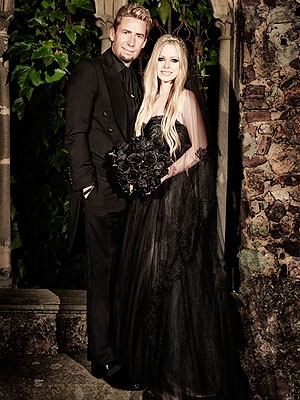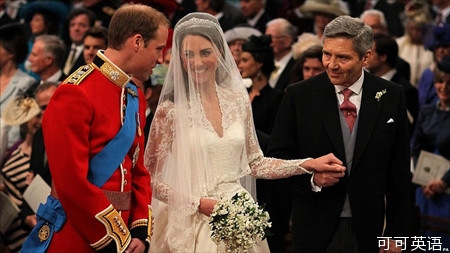(单词翻译:单击)

The image of a veiled bride walking down the aisle on her father's arm could become a thing of the past as a growing trend for 'feminist weddings' has been detected among modern brides to be.
头披白纱的新娘挽着父亲的手缓缓走进教堂....这样的婚礼场面也许即将成为过去时。现在也来越多的女性在自己的婚礼上,用特别的、反传统的方式宣扬着“女权主义”。
Doing away with the engagement ring, choosing not to be 'given away like property' and wearing a colour other than white are key themes gaining traction in the feminist wedding trend.
不需要订婚戒指、不愿意像私有财产一样“被交付于谁”、不选择白色的婚纱作为婚礼服。婚礼上的反传统让女权主义的现代女性们乐此不疲。
The findings, revealed in a survey of 200 brides to be, revealed that almost a quarter of women planned on keeping their maiden name after marriage, while one in 10 were planning to wear a colour other than white on their wedding day.
根据对200个新娘的调查报告,有四分之一的女性计划婚后不随夫姓,另外,10个新娘中有一个不愿意穿白纱。
Traditions such as the wearing of an engagement ring are also increasingly being rejected by brides who feel it is anti-feminist - with such an obvious token to be worn on the finger marking the woman in question as 'taken'.
传统形式的带订婚戒指也被越来越多的女性不能接受,她们认为这种形式是反女权主义的表现,因为带订婚戒意味着打上了“附属于谁”的标签。

The tradition of wearing a veil is being similarly rejected, as some women believe it plays into the idea that a woman is 'revealed' to her husband as the virgin bride (though actually the use of a veil is steeped in history and has very different significance across multiple cultures).
给新娘披上白头纱也被很多女性拒绝,因为很多现代女性觉得这个仪式象征着男人要求自己的女人是处女。(尽管新娘披头纱在不同文化里有很多种意思)
However, while there is undoubtedly a stirring among young brides to be, parents can take comfort in the fact that while some women are beginning to push back against the patriarchy, the majority are still keen to uphold certain traditions, with 76 per cent of brides saying they really would like their father to walk them down the aisle.
然而,尽管这种趋势在年轻女性中越来越流行,甚至有女性在自己婚礼上身穿黑纱来抗议父权,然而让父母们安心的信息是,大多数女性表示,希望在自己的婚礼上,手挽着父亲走向自己的新郎。
Elki Parmar of Wedding Days.co.uk, who conducted the survey, said: ‘Some of the brides we have spoken to are doing things that they feel make their wedding more 'feminist'.
做这份调查的制作人Elki Parmar讲:“一些新娘认为在自己的婚礼上这样做更能体现“男女平等”的观念。”
'That could be reflected by deciding not be given away, the idea being that one of the connotations of this tradition is that the woman is property to be given away.
“传统的结婚形式对女人来讲更像私有财产交易一样这样,女人从此附属于她的丈夫,所以,现代女性在自己的婚礼上这样做,目的是告知大家自己不是附属于谁的。”
‘Other brides are choosing not to wear white on their wedding day as a woman’s white wedding dress traditionally carries connotations of virginal innocence whereas what the groom wears on his wedding day is not perceived to be symbolic, creating somewhat of an imbalance from some feminist perspectives.'
“一些新娘在自己的婚礼上选择不穿白色婚纱,因为白色婚纱在传统意义上来讲蕴含着新娘纯洁无瑕的意思,而新郎的装饰上并没有任何特别含义。现代女性认为,这在某种意义上说是女女不平等的表现。”
Elki said: ‘Many of the women we spoke to thought that changing their last name after marriage to their husband's conformed to a patriarchal ideology and didn’t want to feel they were giving up their own identity for their husbands
Elki讲:“婚后改随夫姓也是很男权的表现,她们不希望嫁了人就失去了自我”
'While some were planning to not change their names at all, others were going to incorporate their husband's name into their own.
“一些女性婚后不愿意改随夫姓,而另一些女性选择将丈夫的姓氏加到自己的姓名里面。”
'However, many women also echoed the sentiment that a couple sharing the same last name is something that binds their family together.
“然而,还是有很多女性认为婚后将姓氏该随夫姓是结合成一家人的意思。”
Kelly Doncaster, Wedding Manager said: “'It is true that couples like to make their wedding their own and often do away with certain traditions.
婚庆经理Kelly Doncaster讲“现在很多夫妻喜欢自己的婚礼个性化,不按照传统形式举行。”
‘For many, traditions are still part of the ceremony but not because of reasons which may be perceived as anti-feminist.
“对于很夫妻,传统的仪式任然是婚礼上的一部分,但和“反女权主义”无关。

'For example the bride will often want her father to ‘give’ her away, not because of anti-feminist reasons but because she loves her father and wants to display that love on her wedding day.
“比如说,很多新娘任然愿意父亲在自己的婚礼上挽着自己走向新郎,将自己的手交到丈夫手里。她们这样做不代表她们反对女权,只是因为她们自己的父亲,想在这个特别的场合表达对父亲的爱而已。”


